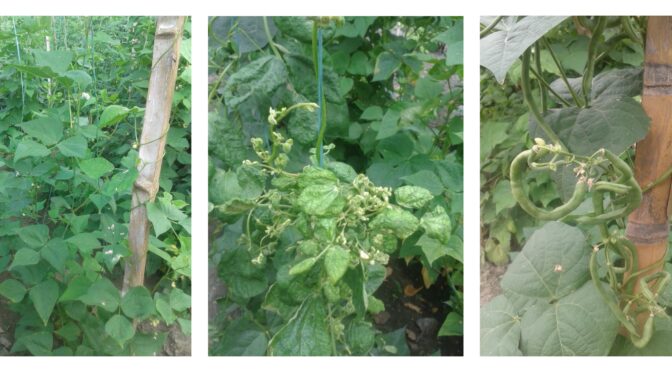By 2035, plant-based protein products such as tofu, tempeh, seitan, vegi convenience or meat analog could replace 11-22% of conventional meat in Switzerland (BLW, 2022). Far too little to live within the limits of available resources of our planet. The Planetary Health Diet suggests eating more pulses (such as peas or beans), nuts, protein-rich grains (such as oats) and pseudocereals (such as buckwheat) and replacing at least half of meat with plant-based proteins (EAT-Lancet, 2020). How can we transform our food systems? We need consumers to accept increasing ampounts of plant-based proteins in their weekly diets and farmers to be able to grow more plant-based proteins in ecological ways.
We introduce research from the PSC network that support increases of plant-based protein production for human nutrition in Switzerland and worldwide.
Plant-based proteins: Finding a resistant gene against the novel bean leaf crumple virus in South American beans
In South America per capita consumption of beans is 14kg/capita compared to Switzerland with below 1.92/capita (statista.com). This shows the importance of traditional beans in the protein-supply of populations in South America.
Now a new threat to this base of food security has arrived: Since 2002 the novel begomovirus (BLCrV) is infecting common bean (Phaseolus vulgaris L.) and is increasingly widespread in Colombia, the Andean and Mesoamerican areas. The virus is associated with leaf crumple symptoms and significant yield losses.
It is transmitted by the whitefly vector Bemisia tabaci and causes devastating yield losses in susceptible cultivars. Current climate change scenarios suggest that the whitefly populations can reach higher altitudes and move towards more temperate regions, expanding the range of infestation to other countries in Latin America.
Management of the disease relies on the use of insecticides to restrict the whitefly advancement, but resistance to these products have started to evolve. A more sustainable solution to control the disease is deploying plant genetic resistance.
Scientists at the International Center for Tropical Agriculture (CIAT) in Colombia, in collaboration with researchers from ETH Zurich and PSC, have assembled a large panel of bean breeding lines to tackle the disease. This panel was tested for BLCrV resistance in multiple field trials over several years. By combining this data with DNA information, they found a single region on chromosome 7 of the bean genome being associated with resistance to the BLCrV disease.
This region contained a candidate gene encoding a Leucine-rich repeat receptor-like kinase (LRR-RLK) family member. Such LRR-RLK genes have been described to act as a receptor of viral molecules at the cell surface, leading to a rapid and non-specific response to a broad range of pathogens.
Using the allelic variation within the gene, one haplotype conferring resistance to the disease was identified. This haplotype was found in lines that were also resistant to other begomoviruses causing heavy yield losses in the Americas. This result provides evidence that breeding efforts for begomovirus resistance has contributed to the accumulation of alleles that also have a primary role in resistance against the novel BLCrV.
The DNA markers associated with the resistant haplotype can readily be used for marker-assisted selection, providing an efficient and rapid tool to improve BLCrV resistance in bean breeding programs.
Citation
Ariza-Suarez D., Beat Keller, Anna Spescha, Johan Steven Aparicio, Victor Mayor, Ana Elizabeth Portilla-Benavides, Hector Fabio Buendia, Juan Miguel Bueno, Bruno Studer and Bodo Raatz. (2022). Genetic analysis of resistance to bean leaf crumple virus identifies a candidate LRR-RLK gene. The Plant Journal.
Some of the researchers
Daniel Ariza Suarez is a post-doctoral fellow at the Plant Molecular Breeding Group, ETH Zurich / Anna Spescha is PhD student at the Plant Pathology group of ETH Zürich. She is a PhD student in the PSC Plant Science Program / Bruno Studer, ETH Zurich is Professor for Molecular Plant Breeding / Beat Keller is researcher at ETH Zurich and is working on the potential of legumes in Swiss agriculture.
References
EAT-Lancet Commission (2020). Summary Report: Healthy Diets. From Sustainable Food Systems.

